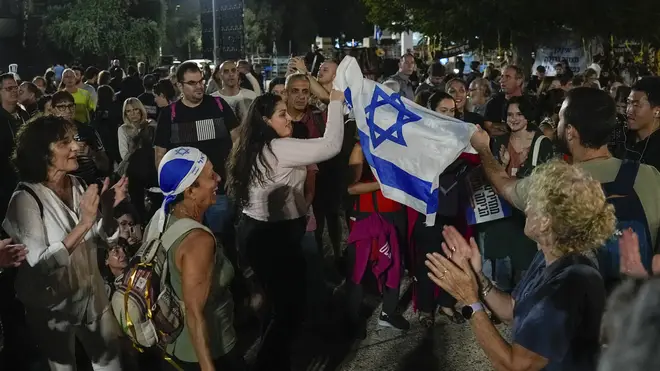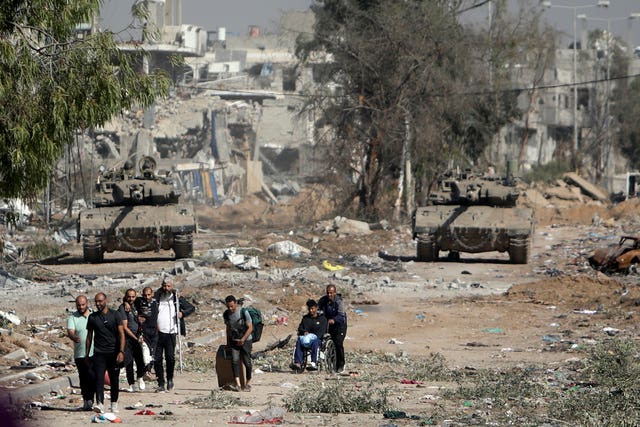
James Hanson 4am - 7am
24 November 2023, 18:14

Israeli military officials said the freed hostages had returned to Israel.
Hamas has released the first batch of hostages under a ceasefire deal, including 13 Israelis who had been held in the Gaza Strip since the militant group staged a raid on Israel nearly seven weeks ago, according to officials.
“Those released include 13 Israeli citizens, some of whom are dual citizens, in addition to 10 Thai citizens and a Filipino citizen,” said Majed al-Ansari, a spokesman for Qatar’s Foreign Ministry. Qatar was a key mediator in the hostage release.
The International Committee of the Red Cross, which delivered the hostages from Gaza into Egypt, confirmed the release, and Israeli military officials said they had returned to Israel and underwent initial medical checks. They are to be accompanied by soldiers to hospitals to be reunited with their families.
They are the first of 50 people to be released from Gaza during a four-day truce that began on Friday.

The freed Israeli hostages included eight women — six in their 70s and 80s — and three children.
Israel confirmed later that it had released 39 Palestinian prisoners. Qadura Fares, who heads an advocacy group for prisoners, said 33 prisoners freed in the West Bank were handed to a team from the International Committee of the Red Cross, and the remaining six were being freed from a Jerusalem jail.
The ceasefire between Israel and Hamas began on Friday, allowing sorely needed aid to start flowing into Gaza and setting the stage for the exchange.
There were no reports of fighting after the truce began. The deal offered some relief for Gaza’s 2.3 million people, who have endured weeks of Israeli bombardment and dwindling supplies of basic necessities, as well as for families in Israel worried about loved ones taken captive during Hamas’s October 7 attack which triggered the war.
The truce raised hopes of eventually winding down the conflict, which has flattened vast areas of the Gaza Strip, fuelled a surge of violence in the occupied West Bank and stirred fears of a wider conflagration across the Middle East.
However, Israel has said it is determined to resume its massive offensive once the ceasefire ends.
On Friday, the pause brought quiet after weeks in which Gaza saw heavy bombardment and artillery fire daily as well as street fighting as ground troops advanced through neighbourhoods in the north.
The last report of air raid sirens in Israeli towns near the territory came shortly after the truce took effect.

Not long after, four tankers with fuel and four with cooking gas entered the Gaza Strip from Egypt, Israel said.
Israel has agreed to allow the delivery of 130,000 litres of fuel per day during the truce — still only a small portion of Gaza’s estimated daily needs of more than a million litres.
For most of the past seven weeks of war, Israel had barred the entry of fuel into Gaza, claiming it could be used by Hamas for military purposes — though it has occasionally allowed small amounts in.
UN aid agencies pushed back against the claim, saying fuel deliveries were closely supervised and urgently needed to avert a humanitarian catastrophe because fuel is required to run generators that power water treatment facilities, hospitals and other critical infrastructure.
The Israeli military dropped leaflets over southern Gaza, warning hundreds of thousands of displaced Palestinians who sought refuge there not to return to their homes in the territory’s north, the focus of Israel’s ground offensive.
Even though Israel warned that it would block such attempts, hundreds of Palestinians could be seen walking north on Friday.
Two were shot and killed by Israeli troops and another 11 were wounded.

During the ceasefire, Gaza’s ruling Hamas group pledged to free at least 50 of about 240 hostages it and other militants took on October 7. Hamas said Israel would free 150 Palestinian prisoners.
Both sides agreed to release women and children first, in stages starting on Friday. Israel said the deal calls for the truce to be extended an extra day for every additional 10 hostages freed.
Israel’s Justice Ministry published a list of 300 prisoners eligible for release, mainly teenagers detained over the past year for rock-throwing and other minor offences. Three Palestinian prisoners are expected to be released for every hostage freed.
The hope is that momentum from the deal will lead to an “end to this violence”, said Majed al-Ansari, a spokesman for the Foreign Ministry of Qatar, which served as a mediator along with the US and Egypt.
But hours before it came into effect, Israeli defence minister Yoav Gallant was quoted telling troops that the respite would be short and the war would resume with intensity for at least two more months.
Prime Minister Benjamin Netanyahu has also vowed to continue the war to destroy Hamas’s military capabilities, end its 16-year rule in Gaza and return all the hostages.
Israel’s northern border with Lebanon was also quiet on Friday, a day after the militant Hezbollah group, an ally of Hamas, carried out the highest number of attacks in one day since fighting there began October 8.

Hezbollah is not a party to the ceasefire agreement but is widely expected to halt its attacks.
The war erupted when several thousand Hamas militants stormed into southern Israel, killing at least 1,200 people, mostly civilians, and taking scores of hostages, including babies, women and older adults, as well as soldiers.
The soldiers will only be released in exchange for all Palestinians imprisoned by Israel, according to the Islamic Jihad militant group, which is reportedly holding about 40 hostages.
It is not clear how many of the hostages are serving in the military or whether the militants also consider reserve soldiers to be “military hostages”.
According to the Palestinian Prisoners’ Club, an advocacy group, Israel is holding 7,200 Palestinians on security charges or convictions, including about 2,000 arrested since the start of the war.
The Israeli offensive has killed more than 13,300 Palestinians, according to the Health Ministry in Hamas-ruled Gaza, which resumed its detailed count of casualties in Gaza after stopping for weeks because of the health system’s collapse in the north.
The ministry says 6,000 people have been reported missing, feared buried under rubble.
Israel says it has killed thousands of Hamas fighters, without presenting evidence.